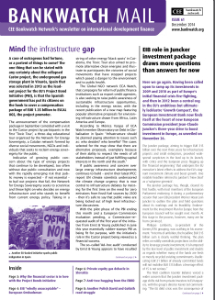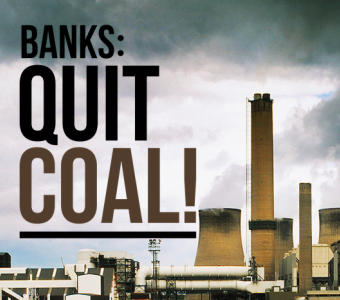EIB role in Juncker investment package draws more questions than answers for now
Publication | 2 December, 2014Here we go again. Having been called upon to ramp up its investments in 2009 and 2010 as part of Europe’s initial financial crisis fire-fighting, and then in 2012 been a central cog in the EU’s ambitious but ultimately lacklustre ‘Growth Compact’, the European Investment Bank now finds itself at the heart of new European Commission president Jean-Claude Juncker’s three-year drive to boost investment in Europe, as unveiled on November 26.
Read moreCastor project sends Project Bonds Initiative shockwaves, taxpayers hit worst
Publication | 2 December, 2014In July 2013, the much-hyped joint European commission/EIB ‘Project Bond Initiative’ (PBI) had scarcely got off the ground – in its pilot phase at least – when unusual natural events took over. Work at the EUR 1.7 billion Castor underground gas storage plant off the coast of Valencia commenced in summer 2013. But by mid-September the Spanish government was forced to halt work at the plant after 220 mini earthquakes in the area were detected in less than a month. Local residents reported the tremors following injections of natural gas to prepare Castor for operations. Subsequent research has found that the gas injection provoked 1,000 earthquakes in the region.
Read moreEuropean Ombudsman hammers EIB over Bosnian bridge maladministration
Publication | 2 December, 2014An unprecedented ruling and serious tough talking emanated from the European Ombudsman at the end of October following an investigation into the EIB’s involvement with a bridge construction project in Bosnia and Herzegovina. Describing the approach taken by the EIB in the case as “wholly unacceptable”, the Ombudsman’s conclusion pulled no punches in asserting that the bank’s “maladministration risks putting into question the European Union’s commitment to strengthening the rule of law in Bosnia and Herzegovina.”
Read moreEIB and EBRD transparency nosedive needs fixing – and fast
Publication | 2 December, 2014Operational transparency standards at the European Investment Bank and the European Bank for Reconstruction and Development continue to deteriorate, according to the 2014 Aid Transparency Index (ATI) published in October by aid watchdog Publish What You Fund (PWYF).
Read moreEBRD-EIB role in Slovak private equity gas debacle questioned
Publication | 2 December, 2014The European Bank for Reconstruction and Development (EBRD) has revealed, in a letter of late October to Bankwatch’s Slovak member group Friends of the Earth-CEPA, that the EnerCap Power Fund, a private equity investor, has pulled out of the controversial COGEN gas power plant being developed in the northern Slovakian town of Považský Chlmec.
Read moreJuncker investment package shifts risk from private investors to EU taxpayers
Press release | 26 November, 2014Brussels – Today European Commission president Jean-Claude Juncker will present his widely anticipated 300 billion euro investment package aimed at stimulating growth in the European economy. Central to the InvestEU programme is a 21 billion euro allocation for the newly-created Euopean Fund for Strategic Investment (EFSI) that has to leverage 315 billion euro from private investors, or 15 times the amount of the fund.
Read moreThe Great Rush – The European Union’s responsibility in natural resources grabbing
Publication | 31 October, 2014Land, forests, water and raw materials are valuable resources that increasingly interest the major players of the economy of our planet. This report collects 16 case studies from around the world in order to better understand the impacts of natural resource grabbing on the local communities, clarify the responsibilities of the European Union and, in conclusion, examine actions to be undertaken to invert this phenomenon.
Read moreTwo great new websites on all things coal
Blog entry | 31 October, 2014As anti-coal movements are gaining momentum around the world, two new websites offer a slew of information about the dirtiest of fossil fuels and the campaigns against it. They also offer a stark reminder that despite progress in the last years coal is far from dead.
Read moreEuropean Ombudsman: EIB weakens EU efforts to strengthen rule of law
Press release | 30 October, 2014Brussels – In an unprecedented ruling this week, the European Ombudsman concluded at the end of an investigation into the EIB’s involvement with a road construction project in Bosnia and Herzegovina that the institution’s behaviour was “totally unacceptable” and it “risked putting into question the EU’s commitment for strengthening the rule of law in Bosnia and Herzegovina.”
Read moreCan the European Investment Bank move ahead of the pack on climate?
Blog entry | 21 October, 2014The European Investment Bank is gearing up for an increased role in spurring growth in Europe as set out by the new Juncker Commission. Yet as Europe’s 2030 climate targets are being undermined by some countries the bank that wants to be a leader in climate action must keep in mind that we can no longer afford growth without sustainability.
Read more



